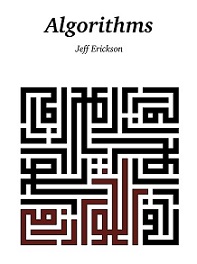
|
FreeComputerBooks.com
Links to Free Computer, Mathematics, Technical Books all over the World
|
|
- Title: Lecture Notes for the Algorithms
- Author(s) Jeff Erickson
- Publisher: Independently published (June 13, 2019); eBook (Creative Commons Licensed, 2019)
- License(s): CC BY 4.0
- Paperback: 472 pages
- eBook: HTML and PDF files
- Language: English
- ISBN-10: 1792644833
- ISBN-13: 978-1792644832
- Share This:

|
Algorithms are the lifeblood of computer science. They are the machines that proofs build and the music that programs play. Their history is as old as mathematics itself.
This textbook is a wide-ranging, idiosyncratic treatise on the design and analysis of algorithms, covering several fundamental techniques, with an emphasis on intuition and the problem-solving process. The book includes important classical examples, hundreds of battle-tested exercises, far too many historical digressions, and exaclty four typos.
Some books on algorithms are rigorous but incomplete; others cover masses of material but lack rigor. This lecture notes uniquely combines rigor and comprehensiveness.
It covers a broad range of algorithms in depth, yet makes their design and analysis accessible to all levels of readers. Each chapter is relatively self-contained and can be used as a unit of study.
About the Authors- Jeff Erickson is a computer science professor at the University of Illinois, Urbana-Champaign; this book is based on algorithms classes he has taught there since 1998.
- Algorithms and Data Structures
- Graph Theory
- Computational and Algorithmic Mathematics
- Computational Complexity
- Discrete Mathematics

- Lecture Notes for the Algorithms (Jeff Erickson)
- The Mirror Site (1) - PDF
- The Mirror Site (2) - PDF
-
 The Little Book of Algorithms (William Lau)
The Little Book of Algorithms (William Lau)
This workbook is designed to help those learning and teaching Computer Science at secondary school level. The aim of the book is to help students build fluency in their Python programming.
-
 Algorithms, 4th Edition, by Robert Sedgewick and Kevin Wayne
Algorithms, 4th Edition, by Robert Sedgewick and Kevin Wayne
It surveys the most important algorithms and data structures in use today. Applications to science, engineering, and industry are a key feature of the book. We motivate each algorithm that we address by examining its impact on specific applications.
-
 Algorithm Design (Jon Kleinberg, et al)
Algorithm Design (Jon Kleinberg, et al)
This book introduces algorithms by looking at the real-world problems that motivate them. The book teaches a range of design and analysis techniques for problems that arise in computing applications.
-
 Algorithms: Fundamental Techniques (Macneil Shonle, et al)
Algorithms: Fundamental Techniques (Macneil Shonle, et al)
The goal of the book is to show you how you can methodically apply different techniques to your own algorithms to make them more efficient. While this book mostly highlights general techniques, some well-known algorithms are also looked at in depth.
-
 Elementary Algorithms (Xinyu Liu)
Elementary Algorithms (Xinyu Liu)
This book doesn't only focus on an imperative (or procedural) approach, but also includes purely functional algorithms and data structures. It teaches you how to think like a programmer - find the practical efficiency algorithms to solve your problems.
-
 Algorithms and Data Structures (Niklaus Wirth)
Algorithms and Data Structures (Niklaus Wirth)
From the inventor of Pascal and Modula-2 comes a new version of Niklaus Wirth's classic work, Algorithms + Data Structure = Programs (PH, l975). It includes new material on sequential structure, searching and priority search trees.
-
 The Algorithm Design Manual (Steven S. Skiena)
The Algorithm Design Manual (Steven S. Skiena)
This book serves as the primary textbook for any algorithm design course while maintaining its status as the premier practical reference guide to algorithms, intended as a manual on algorithm design for both students and computer professionals.
-
 Introduction to Design Analysis of Algorithms (K. Raghava Rao)
Introduction to Design Analysis of Algorithms (K. Raghava Rao)
This book was very useful to easily understand the algorithms. This book is having enough examples on every algorithm. It has written for the sake of students to provide complete knowledge on Algorithms.
-
 The Design of Approximation Algorithms (D. P. Williamson)
The Design of Approximation Algorithms (D. P. Williamson)
This book shows how to design approximation algorithms: efficient algorithms that find provably near-optimal solutions, including greedy and local search algorithms, dynamic programming, linear and semidefinite programming, and randomization, etc.





